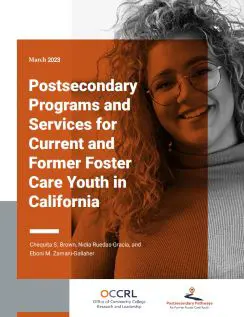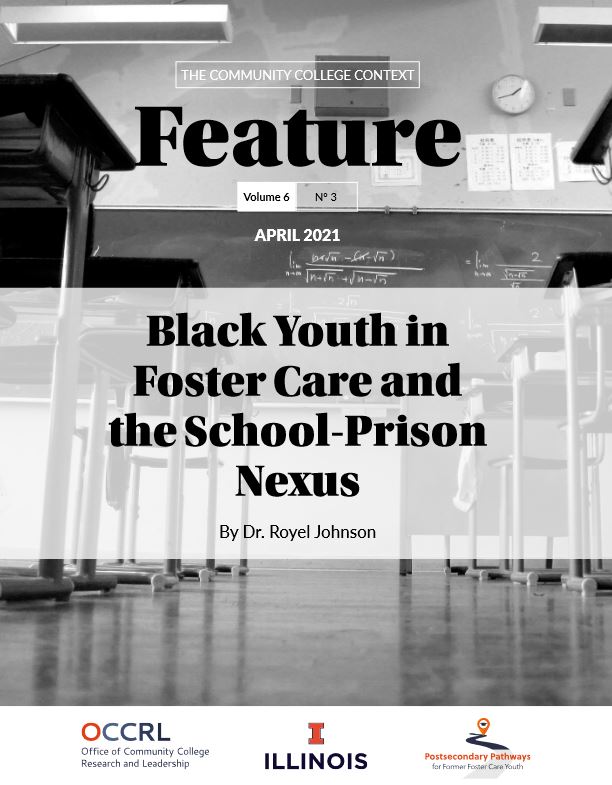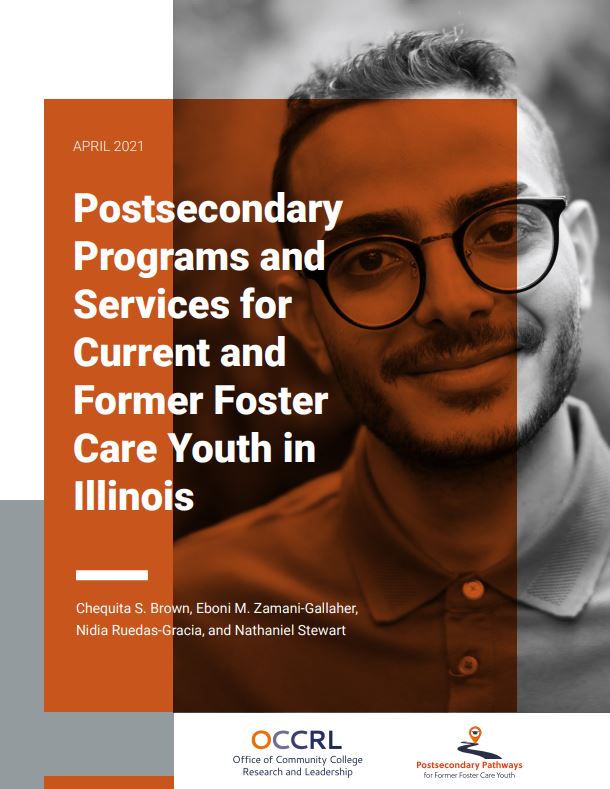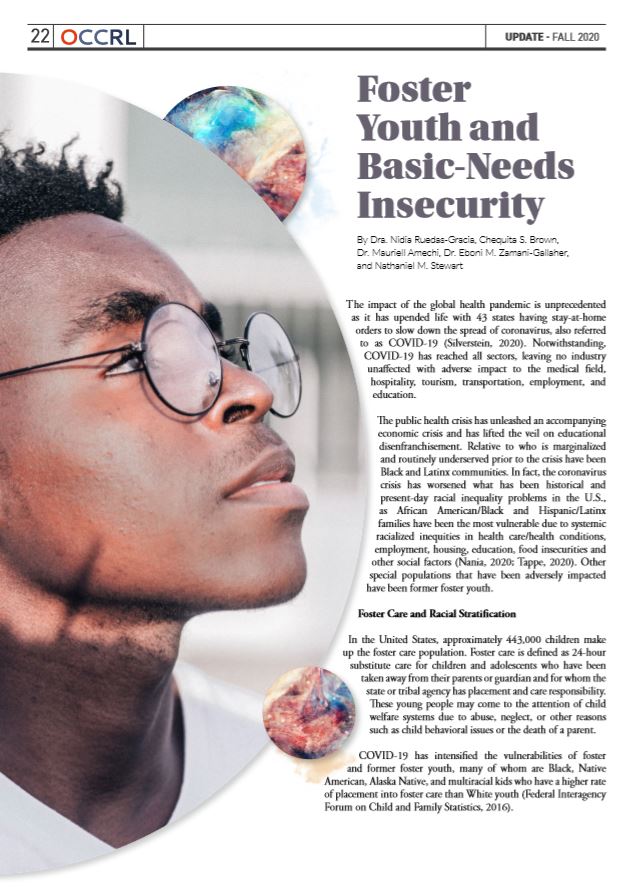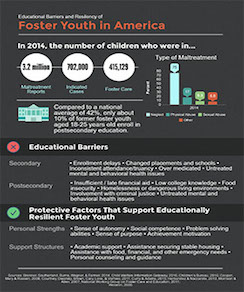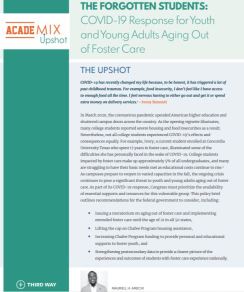
Postsecondary Pathways - for Former Foster Care Youth
This project has been completed and is no longer active.
However, we hope you are able to utilize its resources.
The Postsecondary Pathways for Former Foster Care Youth (PP-FFCY) reflects OCCRL’s commitment to examining and developing postsecondary pathways that support mobility for first-generation, underserved, and minoritized populations, as well as strengthening career pathways to promote seamless transitions from college to careers. This project endeavors to examine postsecondary access, opportunities, and supports for foster youth in Illinois and other states across the county in addressing access and outcomes of FFCY in Career Technical Education (CTE).
Purpose
The Postsecondary Education Pathways for Former Foster Care Youth (PP-FFCY) project is an exploratory study focused on postsecondary pathways for current and former foster youth in Illinois. OCCRL is conducting a comprehensive-needs assessment that provides a descriptive profile of current and former foster youth populations in Illinois; examines postsecondary access, opportunities, and supports for foster youth in Illinois; and addresses disparities in career and technical education (CTE) programs. This project reflects OCCRL’s commitment to examining and developing postsecondary pathways that support mobility for first-generation, underserved, and minoritized populations as well as strengthening and supporting career pathways to promote seamless transitions from college to careers.
Resources
OCCRL aims to increase postsecondary awareness, access, and attainment for current and former foster care youth by providing information on programs and other resources that offer holistic support and services. View the list of postsecondary programs and services.
Strategies to Cultivate a Foster-Friendly Culture on Community College Campuses
 In this episode, Chequita Brown talks with Kate Danielson of the organization Foster Progress, as well as with Anna Wandtke and Tricia Wagner of Rock Valley College in Rockford, Illinois. The group discusses how to cultivate a foster-friendly culture at Illinois community colleges.
In this episode, Chequita Brown talks with Kate Danielson of the organization Foster Progress, as well as with Anna Wandtke and Tricia Wagner of Rock Valley College in Rockford, Illinois. The group discusses how to cultivate a foster-friendly culture at Illinois community colleges.
Navigating College as a Foster Care Alum
 In this episode, OCCRL research assistant Chequita S. Brown talks with Jonathan Stacy, a sophomore at Heartland Community College who is pursuing his studies and a possible career in criminal justice.
In this episode, OCCRL research assistant Chequita S. Brown talks with Jonathan Stacy, a sophomore at Heartland Community College who is pursuing his studies and a possible career in criminal justice.
Listen to the podcast and view the transcript.
Key Elements to Successfully Connecting Foster Care Youth to Educational Resources for Postsecondary Success
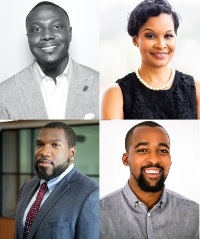 In this episode, Nathaniel Stewart talks with Mauriell Amechi, Regina Gavin Williams, and Blayne Stone Jr. about how the transitions and pathways to postsecondary education are similar and different for Black former foster care students. The scholars also discuss key elements to successfully connect foster care youth to educational resources that help advance the postsecondary education opportunities for this student population.
In this episode, Nathaniel Stewart talks with Mauriell Amechi, Regina Gavin Williams, and Blayne Stone Jr. about how the transitions and pathways to postsecondary education are similar and different for Black former foster care students. The scholars also discuss key elements to successfully connect foster care youth to educational resources that help advance the postsecondary education opportunities for this student population.
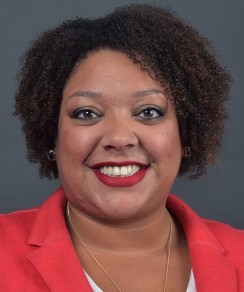
Maddy Day
The Impact of Campus-Based Support Programming on Foster Care Collegians' Postsecondary Access and Retention
In this episode, Chequita Brown of OCCRL talks with Maddy Day about the Fostering Success initiative in Michigan and the impact of campus-based support programming on foster carecollegians' postsecondary access and retention.

Patricia Palmer
How Youth-in-Care in Illinois Can Access Educational Resources to Pursue a Postsecondary Education
In this episode, OCCRL research assistant Chequita Brown continues the conversation on foster care youth by talking about with Patricia Palmer about accessing available resources in Illinois for youth-in-care who want to pursue a postsecondary education.

Nidia Ruedas-Gracia
Conceptualizing 'Sense of Belonging' Among Students From Historically Minoritized Racial Groups Within Higher Education
In this episode, Colvin Georges Jr., a research associate at OCCRL, talks with Dr. Nidia Ruedas-Gracia about what it means to have a sense of belonging and discusses her research in this area. They also discuss how a sense of belonging affects college students from historically minoritized racial groups.
Postsecondary Programs and Services for Current and Former Foster Care Youth in California
By Chequita S. Brown, Nidia Ruedas-Gracia, and Eboni M. Zamani-Gallaher
This brief highlights postsecondary programs and services in California that support youth in care, in addition to young adults who are aging out of foster care. Read more.
Tracking College-to-Career Pathways for Foster Youth
By Chequita S. Brown
In this OCCRL Thought Paper, Chequita S. Brown relates how tracking the data of students with foster care experience helps to recognize them as a legitimate student population. She offers recommendations on how to do this and conveys the many obstacles that can hinder the academic and career success of foster youth. Read more.
Black Youth in Foster and the School-Prison Nexus
By Royel Johnson
In this OCCRL Feature Brief, Dr. Royel Johnson argues that the foster care system, and more specifically congregate care facilities, are part and parcel to the enhancement of carceral state power. Read more.
Postsecondary Programs and Services for Current and Former Foster Care Youth in Illinois
By Chequita S. Brown, Eboni Zamani-Gallaher, Nidia Ruedas-Gracia, and Nathaniel M. Stewart
This research brief provides an overview of programs and services that helps strengthen postsecondary pathways for current and former foster youth in Illinois. Read more.
Foster Youth and Basic-Needs Insecurity
By Dra. Nidia Ruedas-Gracia, Chequita S. Brown, Dr. Mauriell Amechi, Dr. Eboni Zamani-Gallaher, and Nathaniel M. Stewart
This article discusses how COVID-19 has intensified the vulnerabilities of foster youth and former foster youth, many of whom are Black, Native American, Alaska Native, and multiracial children who have a higher rate of placement into foster care than White youth (Federal Interagency Forum on Child and Family Statistics, 2016). Read more.
(From the Fall 2020 UPDATE on Research and Leadership)
Exploring Equity in Postsecondary Education
By Heather L. Fox, Eboni M. Zamani-Gallaher
This chapter examines how postsecondary practitioners are encouraged to work collaboratively with child welfare agencies and other community-based organizations to identify and implement culturally responsive supports for former foster youth to promote early academic achievement. Read more.
The Forgotten Students: COVID-19 Response for Youth and Young Adults Aging Out of Foster Care
By Mauriell H. Amechi
This policy brief outlines recommendations for Congress to consider regarding the country's COVID-19 response, in an effort to prioritize the availability of essential supports and resources for youth and young adults who are aging out of foster care. Read more.
Report Reveals the Economic Impacts of the Illinois Community College System on Students, Communities
On September 29, 2021, the Illinois Community College Board (ICCB) released the "Illinois Community Colleges’ Economic Impacts and Student Employment Outcomes" report. ICCB collaborated with the Center for Governmental Studies (CGS) at Northern Illinois University (NIU) on an in-depth analysis of how Illinois community colleges meet the needs of business and industry, equity, student outcomes, students’ return on investment, and the system’s overall economic impact to local economies and job growth.
In addition, the report examines statewide external factors impacting community colleges such as employment, population, race and ethnicity shifts, and the COVID-19 pandemic.
The report includes a number of significant findings on the return on investment in completing an Illinois community college certificate and/or degree. For example, long-term certificate or Associate in Applied Science (AAS) degrees yield an average annual rate of return of nearly 27%, with an average wage increase of nearly 40% one year after graduation. When examining race/ethnicity, African American graduates increased earnings by 88% and Latinx graduates by 119% three years after graduation.
Additionally, in analyzing students attaining short-term certificates, many programs yield substantial earnings gains three years after completion, including electrical and power transmission installers at $69,216, fire protection at $54,108, and HVAC and refrigerator maintenance at $48,708.
In examining the community college economic impact on the region as employment hubs and economic engines, results found that in fiscal-year 2020, the 48 community colleges in Illinois directly employed 32,867 staff members, with a total payroll of $1.3 billion. In addition to wages and salaries, Illinois community colleges account for approximately $500 million in additional expenditures, for a total of $1.8 billion in operating expenditures.
Beyond the effects of direct spending and employment, the Illinois community college system also strengthens the state's economy by supporting local workforce and economic-development services through employer and business engagement. In 2020, Illinois community colleges engaged with nearly 9,800 employers through program development/review, contract training, professional development, apprenticeships, and job placement.
Different from many other state and national higher education economic impact analyses, this study is unique because of the connectivity of ICCB Centralized Data System student-level data and Illinois Department of Employment Security (IDES) Workforce Longitudinal Data System employee-level wage data, which determines the economic impact of students through their actual employment and earning gains. The economic impacts of the Illinois community colleges were identified through employee-level data, operations expenditures, and capital expenditures from ICCB’s Centralized Data System and annual ICCB financial submissions.
Read the full report and view additional resources on the ICCB website.
Nathan Wilson is the deputy director for research at the Illinois Community College Board.
